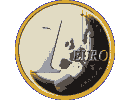
EURO
The European Single Currency
The subject of European Monetary Union (EMU) is an important and controversial issue facing the members of the European Union,
as the date for monetary union quickly approaches.
While politicians and diplomats meet to go forward with the formal arrangements for a single European currency,
at the grass roots level there is still considerable anxiety on the part of average EU citizens.
Will convergence bring economic prosperity,
or will the measures required for entry into the EMU further depress the already stagnant job market in much of Europe?
These and other difficult questions will have to be addressed
as plans for one of the world's largest regional trading blocs moves ahead.
European Monetary Union will have numerous advantages:
Exporters will no longer be at a disadvantage against their European competitors in the European internal market
and in the markets of non-EU states as a result of devaluation of their competitors' currencies.
Companies will have a reliable basis on which to plan.
Tourists will not have to exchange currency, which means their holidays will be cheaper.
The European currency can become a more important world reserve currency than is presently the case;
and competition intensified by greater transparency in prices will improve the efficiency of the European economies.
This will make it possible to safeguard present jobs and certainly create new ones.

The sign for the new single European currency looks like an E
with two clearly marked, horizontal parallel lines across.
It was inspired by the Greek letter EPSILON, in reference to the cradle
of European civilization and to the first letter of the word "Europe".
The two parallel lines across represent the stability of the Euro.
The Euro sign is easily recognizable and in a few years' time
it will be as well known as the dollar sign ($).
On 1 January 1999, 00.00 a.m., the euro became the official currency
of 11 Member States of the European Union
(Belgium, Germany, Spain, France, Ireland, Italy,
Luxembourg, Holland, Austria, Portugal, and Finland)
with a fixed conversion rate against their national currencies.
From now on, the value of the euro against the dollar and all other currencies,
including those of the four Member States staying out of the euro zone
(Greece, Denmark, United Kingdom and Sweden),
will fluctuate according to market conditions.
Although Euro notes and coins will not appear until 1 January 2002,
the new currency can be used by consumers, retailers, companies of all kinds
and public administrations from 1 January 1999 in the form of "written money"
- that is, by means of cheques, travellers' cheques,
bank transfers, credit cards and electronic purses.
What Will Happen and When |
EURO Conversion Rates
EUROSTAT: European Statistics |
Eurolandia

Back to the First Page |
Back to the Foreign Exchange
Back to the Investor Education |
Send us your Comments and/or Questions
